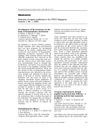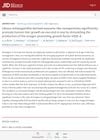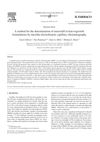 5 citations,
May 2004 in “International Journal of Cosmetic Science”
5 citations,
May 2004 in “International Journal of Cosmetic Science” Versican is important for hair growth and could help find new hair regrowth treatments.
9 citations,
January 2010 in “Biological and medical physics series” The book was the first to focus on the biophysical properties of hair.
 July 2024 in “Journal of Investigative Dermatology”
July 2024 in “Journal of Investigative Dermatology” Ashwagandha nanoparticles help hair grow by increasing a growth factor.
 14 citations,
September 2020 in “Clinical, cosmetic and investigational dermatology”
14 citations,
September 2020 in “Clinical, cosmetic and investigational dermatology” The hair serum significantly improved hair growth and reduced hair fall without causing any skin issues.
 November 2024 in “Plants”
November 2024 in “Plants” Et-BB3-CMU rice bran extract may be a promising natural option for promoting hair growth and preventing hair loss.
 8 citations,
September 2016 in “Asian journal of beauty & cosmetology”
8 citations,
September 2016 in “Asian journal of beauty & cosmetology” Dendropanax morbifera leaf extract could be good for hair growth and cosmetic products because of its antioxidant properties and growth factor effects.
The new method accurately measures active ingredients in hair nourishment products.
 210 citations,
July 1993 in “The journal of investigative dermatology/Journal of investigative dermatology”
210 citations,
July 1993 in “The journal of investigative dermatology/Journal of investigative dermatology” Hair color production in mice is closely linked to the hair growth phase and may also influence hair growth itself.
 109 citations,
July 1993 in “The journal of investigative dermatology/Journal of investigative dermatology”
109 citations,
July 1993 in “The journal of investigative dermatology/Journal of investigative dermatology” Hair color production is closely linked to the active growth phase of hair in mice and may also influence hair growth itself.
 19 citations,
November 2012 in “British Journal of Dermatology”
19 citations,
November 2012 in “British Journal of Dermatology” Dopamine stops hair growth and pigment production in human scalp hair follicles.
 6 citations,
June 2011 in “Pharmacognosy Journal”
6 citations,
June 2011 in “Pharmacognosy Journal” Many products for hair re-growth exist, but a perfect treatment without side effects has not yet been found.
1 citations,
February 2023 in “Plants” BB4CMU rice bran oil may help treat hair loss and gray hair.
 1 citations,
June 2022 in “International Journal of Health Sciences (IJHS) (En línea)”
1 citations,
June 2022 in “International Journal of Health Sciences (IJHS) (En línea)” Herbal hair oils help with hair problems and are safer than synthetic products.
 84 citations,
April 2013 in “Applied Microbiology and Biotechnology”
84 citations,
April 2013 in “Applied Microbiology and Biotechnology” Mannosylerythritol lipids are good for skin and hair care products.
59 citations,
January 2001 in “Dermatology” Hair care products are important for appearance and self-esteem, and their benefits and risks should be accurately communicated by experts.
 41 citations,
October 2000 in “Dermatologic clinics”
41 citations,
October 2000 in “Dermatologic clinics” Better hair care products are needed to protect against grooming and chemical damage.
27 citations,
October 2003 in “Dermatologic Clinics” Certain hair care practices in African American girls can lead to scalp and hair issues.
 21 citations,
July 2002 in “Clinical and Experimental Dermatology”
21 citations,
July 2002 in “Clinical and Experimental Dermatology” Hair care products don't cause hair loss if used correctly.
10 citations,
January 2011 in “Skin research and technology” Procyanidin oligomers can protect hair from oxidative damage and could be good for hair care products.
 6 citations,
July 2005 in “Farmaco”
6 citations,
July 2005 in “Farmaco” A quick and simple method was created to identify minoxidil in hair-growth products using micellar electrokinetic capillary chromatography.
3 citations,
June 2008 in “Springer eBooks” Hair care products clean, protect, style, color, and change hair structure.
 2 citations,
September 2019 in “South Asian research journal of pharmaceutical sciences”
2 citations,
September 2019 in “South Asian research journal of pharmaceutical sciences” Heavy metals in personal care products can cause serious health issues like cancer and hair loss.
 December 2015 in “Biomedical and biopharmaceutical research”
December 2015 in “Biomedical and biopharmaceutical research” Argan oil makes hair care products spread better and improves their texture.
October 2015 in “Cosmetic Dermatology” Hair styling products and tools help improve hair's look and manageability but can damage hair if used incorrectly.
 January 2013 in “Springer eBooks”
January 2013 in “Springer eBooks” Hair care products are important for appearance and self-esteem, and choosing the right ones can help maintain healthy hair.
April 2023 in “CRC Press eBooks” Hair care products mainly work on the hair's surface and need professional guidance for use.

The document concludes that understanding hair's composition and the effects of treatments can lead to better hair care products.
 December 2021 in “Signal transduction and targeted therapy”
December 2021 in “Signal transduction and targeted therapy” Increasing sebum production might help reduce fat and improve metabolism.
January 2020 in “Indian dermatology online journal” Hair styling products can damage hair over time.
 42 citations,
July 2015 in “Cosmetics”
42 citations,
July 2015 in “Cosmetics” Nanotechnology improves hair care products by enhancing ingredient stability, targeting treatment, and reducing side effects, but more research on its toxicity is needed.




















